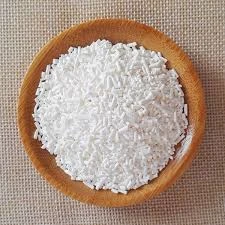
lecithin food additive
Lecithin A Versatile Food Additive
Lecithin, a naturally occurring phospholipid, is an essential ingredient in many food products. It first gained attention in the late 19th century when it was discovered in egg yolk by French chemist Maurice Gobley. Since then, lecithin has evolved into a versatile food additive, finding applications in various culinary and industrial contexts. This article will explore the properties, benefits, and uses of lecithin in food, as well as its implications for health and nutrition.
What is Lecithin?
Lecithin is a mixture of phospholipids, primarily composed of phosphatidylcholine, phosphatidylethanolamine, and other fats. It is extracted from various sources, including soybeans, egg yolks, and sunflower seeds. Lecithin acts as an emulsifier, a substance that helps combine ingredients that typically do not mix, such as oil and water. This property makes it an invaluable additive in the food industry for creating stable mixtures and improving texture.
Functions of Lecithin in Food
Lecithin serves multiple functions in food production. Its primary role as an emulsifier allows it to stabilize emulsions in products such as salad dressings, mayonnaise, and sauces. By reducing surface tension between oil and water, lecithin helps maintain a consistent texture and prevents separation.
In baked goods, lecithin enhances moisture retention and improves the overall shelf life of products. It aids the incorporation of air during mixing, resulting in a lighter, fluffier texture. Additionally, in chocolate production, lecithin reduces viscosity, allowing for smoother coatings and improved flow in manufacturing.
Moreover, lecithin can act as a release agent in cooking and baking, making it easier to remove food from molds or pans. Its ability to act as a thickening agent also contributes to the creamy consistency in products like ice cream and custards.
lecithin food additive

Health Benefits of Lecithin
Beyond its functional roles as a food additive, lecithin possesses several potential health benefits. Rich in phosphatidylcholine, it supports brain health and cognitive function. Phosphatidylcholine is a precursor for acetylcholine, a neurotransmitter associated with memory and learning. Some studies suggest that lecithin supplementation may aid in memory enhancement and cognitive performance, particularly in aging populations.
Additionally, lecithin is known for its contribution to cardiovascular health. It plays a role in metabolizing fats and cholesterol, potentially reducing the risk of heart disease. Lecithin-rich diets have been associated with improved lipid profiles, indicating its positive impact on cholesterol levels.
Lecithin is also popular among those seeking to support liver health. Some research indicates that it may help protect the liver from damage caused by toxins and fatty deposits, aiding in the overall function of this vital organ.
Considerations and Conclusion
Despite its benefits, there are some considerations when it comes to lecithin as a food additive. For individuals with allergies to soy or eggs, derivative forms of lecithin may pose risks. Fortunately, there are alternative sources, such as sunflower lecithin, which is often marketed as a non-allergen.
As a widely used food additive, lecithin holds great importance in the food industry. Its wide-ranging applications, from improving the texture of processed foods to potentially enhancing health, underscore its versatility. As consumers become increasingly interested in food ingredient transparency, lecithin continues to be a staple in both industrial and home kitchens, valued for its functional properties and health benefits.
In summary, lecithin stands out as more than just a simple emulsifier; it embodies the intersection of food science and nutrition, enhancing culinary creations while potentially offering health advantages. As research on its benefits continues, lecithin is likely to maintain its relevance in the evolving landscape of food additives.
-
Sodium Dichloroisocyanurate Safety Handling ProtocolsNewsJul.29,2025
-
Mining Chemicals for Copper Extraction Processes GuideNewsJul.29,2025
-
Fertilizer for Sale Shipping and Storage TipsNewsJul.29,2025
-
Dimethyl Disulfide as Sulfurizing AgentNewsJul.29,2025
-
Benzotriazole Safety Data Handling and Storage GuidelinesNewsJul.29,2025
-
Ammonium Bicarbonate Safety Handling Storage GuidelinesNewsJul.29,2025
-
The Transformative Role Of Trichloroisocyanuric Acid in Water TreatmentNewsJul.23,2025
Hebei Tenger Chemical Technology Co., Ltd. focuses on the chemical industry and is committed to the export service of chemical raw materials.
-

view more DiethanolisopropanolamineIn the ever-growing field of chemical solutions, diethanolisopropanolamine (DEIPA) stands out as a versatile and important compound. Due to its unique chemical structure and properties, DEIPA is of interest to various industries including construction, personal care, and agriculture. -

view more TriisopropanolamineTriisopropanolamine (TIPA) alkanol amine substance, is a kind of alcohol amine compound with amino and alcohol hydroxyl, and because of its molecules contains both amino and hydroxyl. -

view more Tetramethyl Thiuram DisulfideTetramethyl thiuram disulfide, also known as TMTD, is a white to light-yellow powder with a distinct sulfur-like odor. It is soluble in organic solvents such as benzene, acetone, and ethyl acetate, making it highly versatile for use in different formulations. TMTD is known for its excellent vulcanization acceleration properties, which makes it a key ingredient in the production of rubber products. Additionally, it acts as an effective fungicide and bactericide, making it valuable in agricultural applications. Its high purity and stability ensure consistent performance, making it a preferred choice for manufacturers across various industries.











